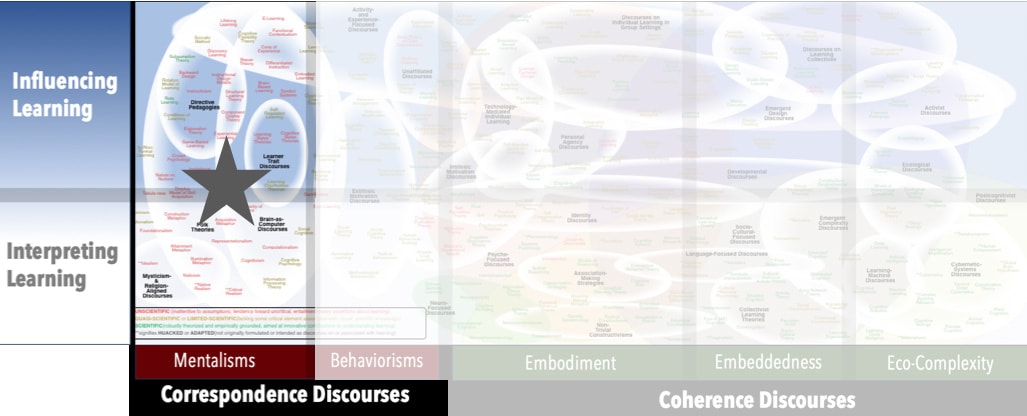Focus
Creation of inner representations of external realitiesPrincipal Metaphors
- Knowledge is … external, objectified truths/reality
- Knowing is … internal representations
- Learner is … an internal observer
- Learning is … internalizing
- Teaching is … representing
Originated
Ancient (entrenched in the language)Synopsis
Mentalisms reach across any theory that (1) assumes a separation of mental from physical (inner from outer, subjective from objective, etc.) and (2) casts learning in terms of mental images, models, encodings, or other inner representations of the existing world. Some sort of barrier – typically the body, or fallible senses, or faulty subjective interpretations – is seen to prevent direct, first-hand knowledge of reality. The measure of truth among Mentalisms tends to be the extent to which internal representations match with external reality. Subdiscourses include:- Cognitive Learning Theory – an umbrella category that includes any theory that assumes or asserts the role of mental activity in learning. The phrase Cognitive Learning Theory is most often heard as an opposite or alternative to Behaviorisms.
- Conscious Mentalism – an umbrella notion that applies to any perspective in which consciously available mental phenomena (e.g., thoughts, emotions, desires) are seen as the main causes of action. Most examples of Conscious Mentalism have been articulated in explicit response to Behaviorisms.
Commentary
Among the many criticisms of Mentalism, the most frequently cited, and perhaps the most condemning, the perspective’s need for a “homunculus” – an inner being who observes mind-based representations of reality. The assumption that there is another level of being who is inside, watching, presents a question of how that homunculus is making sense of its reality – that is, does one’s homunculus have its own inner homunculus, and so on? More broadly, the term “Mentalisms” actually comes out of Behaviorisms, where it was employed to distinguish their asserted-to-be-scientific study of observable behaviors from assumed-to-be-unscientific discussions of mind-based cognition. As with many dualisms, the mentalism–behaviorism binary was popularly seen to span the full spectrum of possibility, and thus blinded many to such untenable separations as thought from action, self from other, individual from collection, and human from more-than-human.Subdiscourses:
- Cognitive Learning Theory
- Conscious Mentalism
Map Location

Please cite this article as:
Davis, B., & Francis, K. (2022). “Mentalisms” in Discourses on Learning in Education. https://learningdiscourses.com.
⇦ Back to Map
⇦ Back to List
